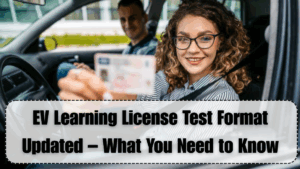EV learning license requirements have now been updated across India, reflecting the growing shift toward electric two-wheelers and four-wheelers. The Regional Transport Offices (RTOs) under the Ministry of Road Transport and Highways have rolled out a revised format for learners applying specifically for electric vehicle categories. The new structure aims to increase public safety, raise awareness about battery-powered mobility, and ensure that drivers understand how EVs differ from conventional fuel-based vehicles.
The updated process includes new questions, safety modules, and EV-specific performance-based assessments. The learner’s test now emphasizes eco-driving habits, charging station use, battery safety, and regenerative braking awareness. These RTO updates apply across all Indian states and Union Territories, streamlining the learning process and helping first-time EV users become more responsible drivers.

Key Changes in the New Test Format
The EV learning license test has been redesigned to test not only road rules but also EV-specific knowledge. These updates ensure that applicants understand the nuances of operating electric vehicles safely.
Key changes include:
-
Addition of EV-related questions in the theory test
-
Modules on battery charging protocols and fire safety
-
Questions about torque sensitivity and instant acceleration in EVs
-
Simulations on regenerative braking and speed control
-
Interactive digital format on touch-screen kiosks at RTOs
These RTO updates are now live and mandatory for all new EV learning license applicants in applicable categories.
Who Needs the EV Learning License?
If you’re planning to drive a mid- to high-speed electric vehicle, you must first obtain an EV LL (Learning License). This applies to electric scooters, motorcycles, three-wheelers, and even cars if they exceed the basic threshold set by the government.
EV Learning License is mandatory for:
-
Electric two-wheelers with speeds above 25 km/h
-
Electric cars and e-autos
-
Retrofitted vehicles converted from petrol to EV
-
Individuals seeking a full license for EV categories
Low-speed scooters (under 250W power and below 25 km/h) do not require a license.
Application and Test Process
The application process for an EV learning license remains straightforward and can be completed online or in person. What’s new is the added emphasis on EV-specific training and test formats.
Steps to apply:
-
Visit the Parivahan Sewa portal or your local RTO
-
Choose ‘Apply for Learning License’
-
Select your vehicle category (ensure EV category is chosen)
-
Upload required documents and pay the fee
-
Schedule a test slot at the RTO
-
Attend the EV-focused learner’s test on the chosen date
Upon passing the test, the EV LL is issued immediately, valid for 6 months. You can then proceed to apply for a permanent license after completing the required driving practice.
Documents and Fees
To apply for an EV Learning License, ensure the following are ready:
-
Aadhaar card linked to mobile number
-
Passport-sized photograph
-
Proof of age (birth certificate, PAN card)
-
Proof of residence (electricity bill, rental agreement, voter ID)
-
Medical certificate (Form 1A for applicants aged 40+)
The typical fee ranges between ₹150–₹300 depending on the state and the number of vehicle categories applied for. These fees have been standardized as part of the new RTO updates for EV categories.
FAQs
What is an EV learning license?
It is a temporary driving permit issued to individuals who want to operate electric vehicles. It allows learners to practice driving before applying for a full EV license.
What’s new in the EV LL test format?
The new test format includes EV-specific modules on battery charging, regenerative braking, and torque sensitivity. These are part of the latest RTO updates.
Can I apply for an EV LL online?
Yes, the application and scheduling for the EV learning license can be done through the Parivahan portal or your regional RTO’s website.
Is the EV LL required for low-speed scooters?
No, if your electric scooter is under 250W power and below 25 km/h speed, you do not need an EV LL or registration.
How long is the EV learning license valid?
An EV LL is valid for 6 months. During this period, you must complete your driving practice and apply for a permanent EV license.
Click here to know more.